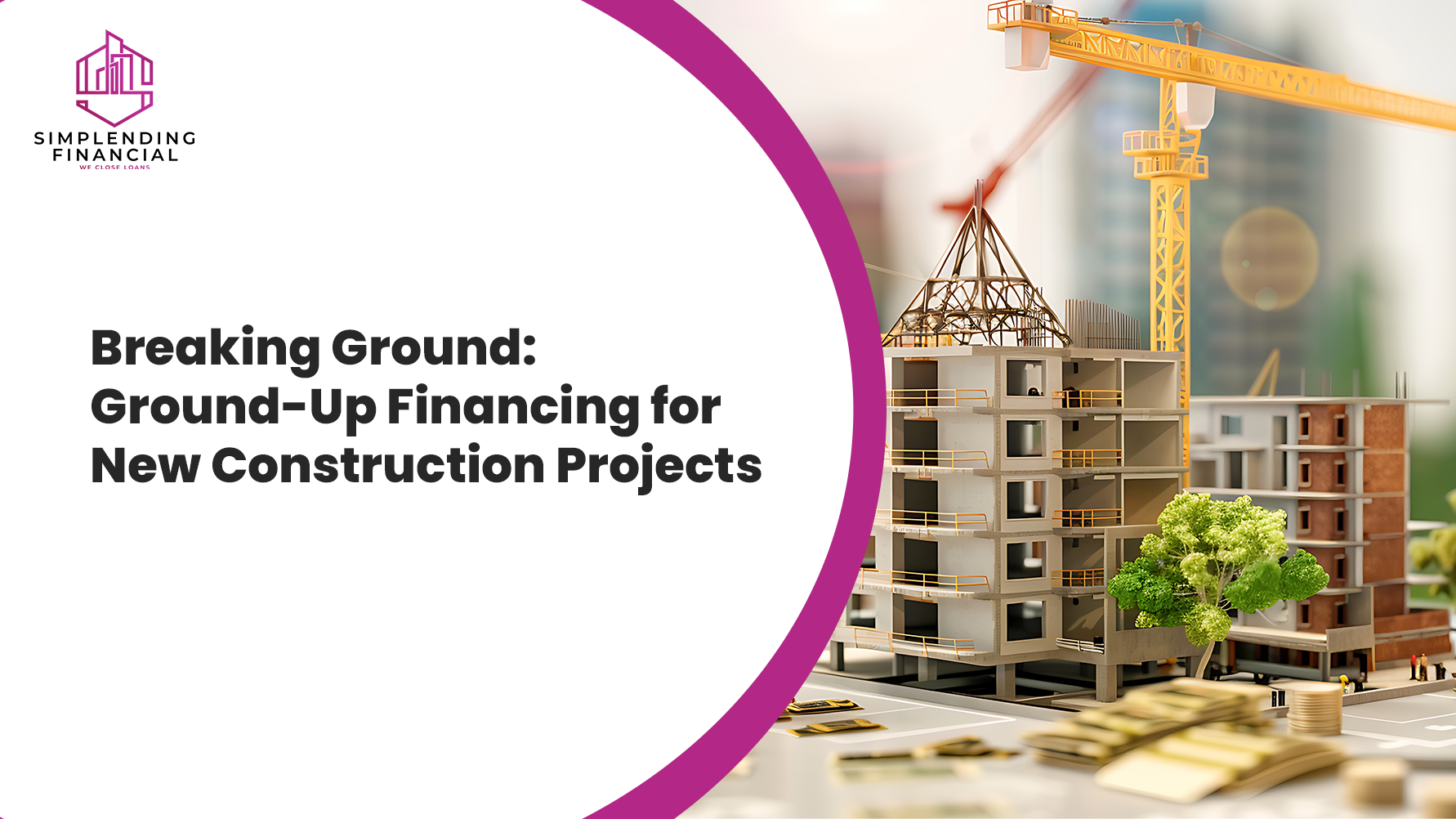Breaking Ground: Ground-Up Financing for New Construction Projects
28 Aug 2024
Posted By Admin
Starting a new construction journey is always full of excitement and challenges. Whether you want to go with residential project, commercial buildings or mixed-use buildings, making financial arrangement before starting the project is a cornerstone to transform your dream into reality. In this regard, commercial ground up construction loans comes into picture especially for new construction work. This strategy can be a game-changer for you that come with its own set of benefits and opportunities. Today, we will cover all the nuances of ground-up financing to let you know about it and how it will be a boon for your next project.
What is Ground-up financing?
It refers to the capital required for the completion of your entire construction work, right from the land acquisition to the building completion. Unlike other financing options that focuses on renovation of existing construction or buying of already constructed properties, ground-up help builders to get financial help for their new properties. This help is crucial for builders that want to start a project right from the beginning. They can utilize ground-up financing for multiple purposes like land purchase, construction and even for marketing and leasing.
Main aspects of Ground-up financing
Land acquisition
In the construction work the initial step is to purchase a plot of land. With ground up construction financing you can acquire the funds required to purchase land on which construction work will happen. This first step requires major capital especially if you need land in high-demand areas.
Construction costs
The construction costs include labor expenses, equipment costs, materials and contractor fees. Construction cost is the major aspect of your budget that demands careful planning and management to avoid any overruns and delay.
Soft costs
Along with the hard cost associated with the construction, you must consider soft cost too. This covers architectural fees, legal expenses, engineering reports, permits and insurance. While these factors are not directly related to physical construction, these are essential parts of project completion.
Contingency funds
Unexpected expenses are part of every construction project. These contingency funds must be kept apart to address such unforeseen costs. This will ensure project to remain on track always.
Project marketing and leasing
After completion of construction work, builder will require funds for property marketing and securing tenants or buyers. This condition is especially crucial for commercial and residential builders that need strong marketing strategy to convince buyers and generate revenue
Types of ground-up financing
There are multiple ground-up financing options available; each one of them has its own pros and cons. You must know every option to decide which one will be suitable for you.
Construction Loans
These loans are for short-term specifically designed to cover the building cost of a new project. The interest rate of these loans is higher as compared to traditional mortgages as these loans have higher risk and short duration. However, you have the flexibility to draw capital at any stage of construction. After project completion, the loan will get converted into permanent mortgage, called as “construction-to-permanent loan.”
Hard money loans
These are asset-based loans given by investors or private lenders. These loans are often required when getting traditional loan is not possible and quick funding is required. These loans usually have higher interest rates with shorter repayment terms. This option is suited for those that have less-than-perfect credit and needs quick funds.
Equity financing
It is about getting capital by selling ownership share in the project to invest. This option is suitable for those who don’t want to be in debt. In exchange of the investment, equity partner will receive a portion of profit gained in the project. This also implies sharing decision-making power and project control with the investors.
Joint ventures
It is about pooling two or more parties to share their resources and expertise to fund and complete construction work. This joint venture is recommended when you are short in capital or expertise for project completion. Joint ventures facilitate risk and reward sharing, thus making it a good option for many developers.
Government grants and subsidies
Based on your project and location, builder may become eligible for government grants and subsidies. These funds support particular types of development, like affordable housing or eco-friendly sustainable projects.
Challenges and considerations
While there are various benefits of ground-up financing, it has its own challenges. You must be aware of those challenges to take an informed decision.
Risk management
Construction projects come with some risk. Delays, unexpected issues, cost overrun can have an impact on your budget and timeline. Effective risk management strategies and comprehensive planning can help you plan accordingly to reduce the risk.
Project management
To complete the project successfully you may require robust project management. This covers construction progress, managing contractors and to ensure that the construction work always remain on time and within budget.
Conclusion
Ground up financing can give a new life to your construction project. You must go through all the financing options available to take informed decision that can match with your project objectives. As you start your new venture, keep your focus on thoughtful planning and financial management to turn your vision into reality. ground up construction loans provide essential financial support for new building projects, offering flexibility and growth opportunities. By partnering with experienced ground up construction lenders, developers can access tailored commercial ground up construction loans to bring their visions to life.


